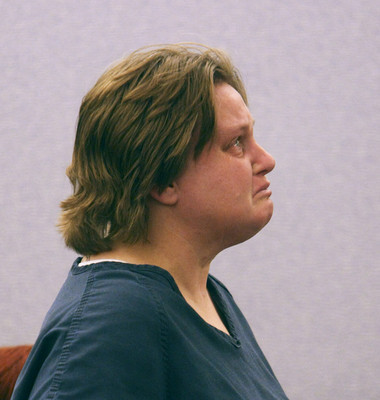Mother’s case filled with gray areas
At first glance, Lena Anderson's murder case appears open and shut.
The 40-year-old mother of two is accused of killing her 15-year-old son by not providing him with adequate medical care. The boy, Patrick Atkins, died in February after suffering from abdominal pain, weakness and other symptoms of a chronic kidney disorder.
Authorities said Anderson was repeatedly warned that not caring for Patrick would result in his death.
She is charged with murder by child abuse. Authorities said she is criminally liable for Patrick's death because she willfully withheld medical treatment from her son.
"This is a woman who has absolutely demonstrated that she's got no regard for her child," said Chief Deputy District Attorney Lisa Luzaich.
But during a brief appearance Tuesday morning in Las Vegas Justice Court, Anderson's attorney said she was a loving, caring mother who did everything she could to help her chronically ill son.
Deputy Public Defender Dan Silverstein said Anderson had properly cared for Patrick, who was diagnosed at age 4 with a chronic kidney condition. At the time, he was placed on multiple medications and had to use a catheter to drain fluids from his body. The catheter had to be replaced four times a day.
Silverstein said the medications, which included Flomax, Ditropan and Nutropin, made Patrick ill and he stopped taking them despite his mother's attempts to keep him on the regimen.
Flomax and Ditropan are used to treat urinary problems while Nutropin is a human growth medication.
Rather than live as a sickly teen, Patrick, who attended Western High School, probably knew he would eventually die and wanted to live out the last few years of his life as a normal child, Silverstein said.
"Maybe Patrick Atkins decided that the quality of life was better than the quantity of life," Silverstein said. "Maybe he decided he would rather live out the few years that he had left as a normal child rather than live longer as a sickly, weak child."
In a February interview with authorities, Patrick's 17-year-old brother told police that after Patrick stopped taking his medications, he could play football and skateboard like other teens.
The brother, Andrew Atkins, also told police that their mother repeatedly told Patrick to use the catheter.
"She (Anderson) would, like, keep telling him to do it, and keep telling him to do it, till finally he did it," Andrew said in a sworn statement obtained by the Review-Journal.
Andrew attended Tuesday's court hearing with a family friend with whom he is staying. His mother appeared in court in a navy blue prison jumper and in shackles.
Silverstein told the court that Anderson, a cashier at Red Rock Resort, tried many times to get Patrick to comply with his medical care, but that he was a rebellious teen who wanted to take control of his life -- and death.
"What do you do as a mother when you tell your child, you nag your child repeatedly, 'You have to take these pills.' And your child says, 'I did.' And he lies to you," Silverstein said.
At the end of the hearing, Justice of the Peace Nancy Oesterle set bail at $375,000, an amount too high for Anderson.
Paul Friedman, a medical ethics expert in Phoenix, said that if parents can't get their children to take medications on their own, they can try to administer the drugs themselves or watch closely when the child swallows the pills.
If the child continues to refuse, the parent can petition a court to appoint a guardian who would ensure that medical decisions are made.
But the gray area emerges when a teen becomes independent and mature.
Some teens, even those younger than 18, can make informed and conscious decisions to not take life-saving medications or treatments and come to terms with their own death, Friedman said.
"She (the mother) may have wanted to do something merciful," he said. He said he had no direct knowledge of Anderson's situation.
Anderson's case has plenty of gray area.
By age 4, Patrick had suffered permanent kidney damage and was placed on medications.
According to child welfare records, he was diagnosed with chronic nephrogenic disorder, a condition that required close monitoring and medical treatments. He could die without proper medical care.
Patrick's father, who died last year, had the same disorder, Silverstein said.
In 2002, a school nurse contacted child protective services because Anderson wasn't supplying the school with the appropriate catheters for Patrick.
Anderson, whom a nurse called "evasive," told authorities that Patrick didn't have the catheters because he developed a rash from them, according to a Metropolitan Police Department report.
The next year, CPS again got involved after Anderson didn't show up for a doctor's appointment with Patrick and didn't comply with a doctor's orders for lab testing.
Anderson told police that when Patrick was 12, she made a conscious decision that his condition might "change on its own" and stopped taking him to a doctor, the report states.
She said her son didn't like taking medications. And she said she was tired of "fighting her son" over the medicines. Once the prescriptions ran out, she stopped filling them.
The week before Patrick died, Anderson took him to Southwest Medical Urgent Care because he was suffering from painful urination.
However, she didn't tell a nurse about Patrick's medical history. He was diagnosed with a urinary tract infection.
On Feb. 6, Patrick was taken to University Medical Center with a bloody nose that wouldn't stop.
He died that day of acute renal (kidney) failure, chronic renal insufficiency and congenital posterior urethral valves, according to the Clark County coroner's office.
"She (Anderson) was repeatedly warned that the consequences of her not following through with this would be that he would go into kidney failure," Chief Deputy District Attorney Luzaich said. "She was warned that he would die."
Contact reporter David Kihara at dkihara@reviewjournal.com or 702-380-1039.

















